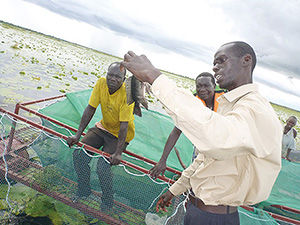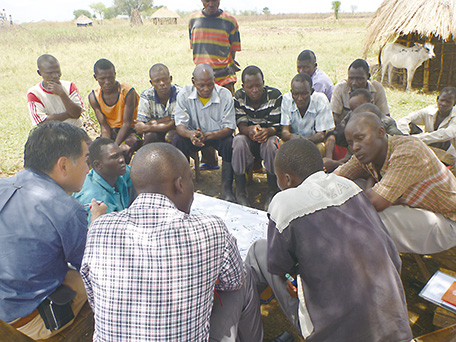Stories from the field 05
A Japanese attempt to bring back an African wetland
– Residents of Uganda place high hopes on a wetlands management project

Mr. Okoche checking tilapia in a fish farming cage. (Photo: Yasuhiko Muramatsu)
“Since the Japanese project started, the wetlands environment has gotten steadily better. The project site has become a good breeding place for the wild tilapia. The population of the fish around the cultivation cages has increased.”
These are the words of Mr. Joseph Okoche, a man living in Bukedea District in the eastern part of the East African country of Uganda. Along with his partners in the NGO Tilapia Papa, Mr. Okoche is working to raise tilapia in a nearby lake, improve the environment, and raise the standard of living of the local community. Tilapia are a freshwater, white fish. They are delicious, with a good texture, and are popular among the people of Uganda. Mr. Okoche and his fellows are now farming tilapia by using floating cages in a nearby lake.
Up until about 10 years ago, attacks by anti-government forces were rampant in Uganda, especially in the northern part of the country. This forced many residents of nearby regions to become refugees and laid waste to the local economy. Bukedea District was one such region. Here, even after the civil war settled down, floods and droughts continued to make life hard for local residents. Mr. Okoche was able to get a scholarship to study fisheries science at university. His involvement with the activities of Tilapia Papa began out of a desire to use what he learned of fisheries science to make his village thrive again after returning from school and seeing the horrid state of his hometown. A diverse range of creatures live in the wetlands connected to the lake, bringing countless blessings to the area. The wetlands are an important source of income for local residents and those who come to the area from outside the region alike.
“After the civil war, farming and hunting increased around the lake, and the environment there changed a lot. Plants never before seen in the area started to thrive, and we were no longer able to catch fish. I knew that something had to be done to rejuvenate my hometown. We are aiming to revitalize the local economy through fish farming while at the same time protecting the environment,” commented Mr. Okoche.
With roughly 7,000 individual wetlands spread throughout Uganda, approximately 13% of the country is a wetland space. However, in the last 15 years, due to unplanned land reclamation and other factors, the total area of the country's wetlands has decreased by approximately 25%. Although the Ugandan Government had positioned the protection and sustainable management of wetlands as national priority issues, no clear management plan had been formulated, and even the data necessary to formulate such a plan had not yet been put in order. As such, soil and water environments continued to deteriorate, and the habitats of the birds, fish, and other creatures living in the wetlands kept getting worse. There are even reports that say rice yields are declining due to lowered water levels and soil erosion.
To address this situation, the Government of Uganda requested that Japan implement a Technical Cooperation Project with the aims of carrying out a scientific investigation into the conditions of the country's wetlands, organizing a relevant wetlands data and developing a management plan, and promoting the protection and sustainable use of the wetlands. Based on that, National Wetlands Management Project was started in February 2012 by JICA for the Namatala Wetlands in eastern Uganda and the Awoja Wetlands, including Bukedea District.

An expert, Mr. Muramatsu (left), explaining to local residents. (Photo: Yasuhiko Muramatsu)
Wetlands management project expert Mr. Yasuhiko Muramatsu of CTI Engineering International Co., Ltd. explained, “In the beginning, we undertook surveys and collated data related to basic information on the two major groups of wetlands that were the target of the project. This was useful for the development of the wetlands information database. Furthermore, based on the results of the surveys, we also supported the formulation of the management plan for the entirety of the two wetlands groups. Currently, we are continuing to help at the regional level with the formulation of wetlands management plans. For the future, we plan to support protection activities in selected regions.” He is aware that the local Ugandans, who have always relied on the wetlands to live, deep in their heart understand the importance of protecting them. The problem was how the wetlands were used. They were used haphazardly. The Japanese project is an important step in improving that situation.
Along with implementing the planned protection of the wetlands, the project will also ascertain methods for local residents to make a living by revitalizing the ecosystems of the fish and other creatures living in the wetlands. Mr. Okoche thinks he can identify with this Japanese way of thinking. He also has high expectations for the fostering of human resources to undertake wetlands management through this project. “By the time this project ends, we will have trained people with a knowledge of wetlands. That will make it possible for the Ugandans to manage the lake on their own. I can picture local people working hard for the protection of the lake environment and the natural resources living there. I am grateful that Japan is cooperating in such a way that will allow us to create harmony between our region and nature.”
The cooperation of local people is indispensable for the management of the wetlands. The wisdom and experience of Japan, nurtured through the country's long history of trying to keep nature and humanity in balance, is also being tested in an effort to see whether the bountiful wetlands of Uganda can be resuscitated, together with the help of local residents.
<< Previous Page Next Page >>
Main Text | Statictics and Reference Materials | Stories from the field | Master Techniques, From Japan to the World - | ODA Topics
